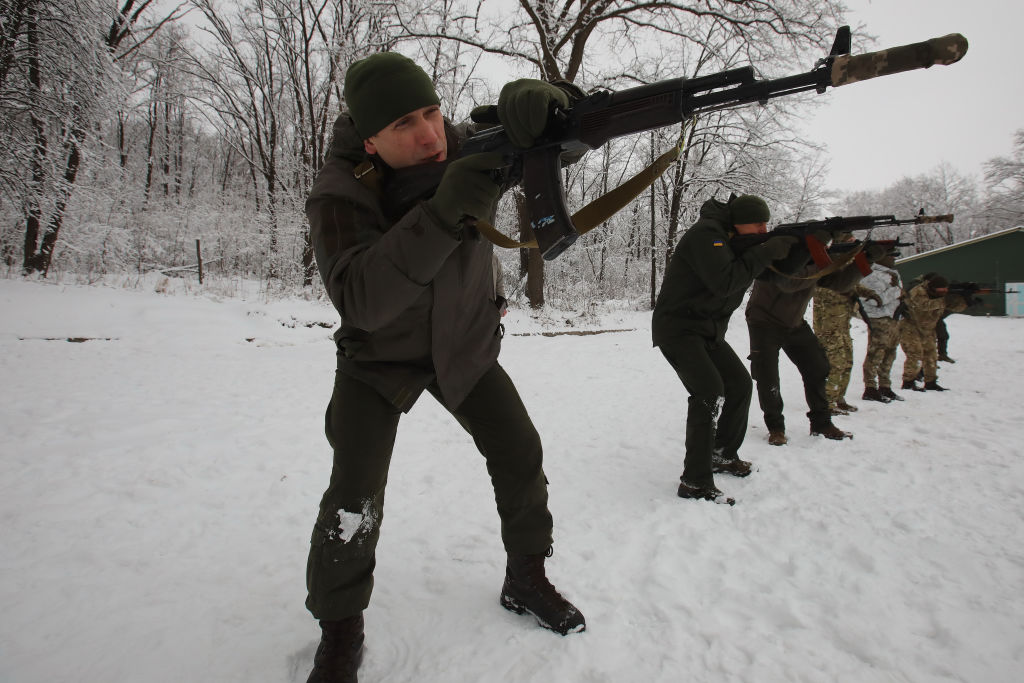Ukraine faces soldier shortage as war with Russia drags on
As the Ukrainian military struggles with low recruitment, will the ongoing effort to repel Russia's invasion come down to a matter of manpower?


A free daily email with the biggest news stories of the day – and the best features from TheWeek.com
You are now subscribed
Your newsletter sign-up was successful
It's been nearly two years since Russia's still-ongoing invasion of Ukraine shocked the world and galvanized Western nations to a degree unseen since the Cold War. In that time, tens of thousands of Ukrainian soldiers have been estimated killed in battle, alongside hundreds of thousands of their Russian counterparts, according to the Kyiv Post. All told, recent U.S. intelligence estimates that Russia has lost "nearly 90% of the personnel it had when the conflict began," Reuters reported — a staggering figure that brings into focus the sheer size and scale of the past two years of warfare.
Still, in spite of what is allegedly a nearly 1-1 turnover in the Russian military since the start of the war, it's Ukraine which now finds itself at a loss for manpower — even as the conflict between both countries seems to have stagnated into a protracted stalemate. Under siege by a vastly larger global superpower, the Ukrainian armed forces have spent months struggling to replenish their ranks and regain momentum against a foe with a seemingly bottomless reserve of potential new recruits. With lagging enlistment an existential concern for Ukraine, the country has embarked on a major effort to expand its ranks, all while continuing to make the case for foreign aid to help support the ongoing war effort.
Just how serious is Ukraine's recruitment problem, and what is it doing to ensure the country has enough manpower to continue its fight against Russian imperialism?
The Week
Escape your echo chamber. Get the facts behind the news, plus analysis from multiple perspectives.

Sign up for The Week's Free Newsletters
From our morning news briefing to a weekly Good News Newsletter, get the best of The Week delivered directly to your inbox.
From our morning news briefing to a weekly Good News Newsletter, get the best of The Week delivered directly to your inbox.
'Conscription raids'
The Ukrainian military is "desperately looking to plug its front lines" against Russian offensives, with some military commanders "resorting to conscription raids on gyms and shopping centres," The Economist reported this month. The result, according to the magazine, is that "few of those who are signed up this way make good soldiers." Russia, meanwhile "looks favoured in the long run" with a pool of potential recruits — particularly those in prisons and from poorer communities — about four times larger. Ukrainians, however, are less likely to enlist in part because many no longer see the war with Russia "in the existential terms" that defined the conflict at its onset, according to a Defense Ministry spokesperson.
Some potential recruits are similarly dissuaded by the fact that Ukraine has "no clear deadline for the demobilization of soldiers" including those who have served for nearly two years, Germany's DW News reported. A petition saying that "military service cannot remain open-ended and calling for troops to be given a clear timeline" for dischargement garnered 25,000 signatures, and prompted several protests in Kyiv, Reuters reported last month.
Meanwhile, military recruiters' "aggressive methods go well beyond the scope" of their authority, causing the number of court rulings on alleged conscription abuses and errors to skyrocket to more than 200 in November alone, according to The New York Times. Similarly, corruption among recruitment officers prompted a mass firing this summer by Ukrainian President Volodymyr Zelenskyy, who announced in August that the government had "opened 112 cases against 33 officials involved in recruitment" over alleged bribes, The Times reported.
Speaking with Time magazine last month, one Ukrainian official close to Zelenskyy stressed how dire the situation had become by pointing out that even if Western arms and equipment were delivered without delay or reduction, "we don't have the men to use them."
A free daily email with the biggest news stories of the day – and the best features from TheWeek.com
'Everyone knows there are opportunities'
High on Ukrainian officials' list of personnel-boosting efforts is cracking down on draft dodging. Speaking with the Kyiv Post, one draft dodger who paid $5,000 for a medical certificate that exempted him from the draft explained that even though "it all felt wrong and disturbing, everyone knows there are opportunities" to escape conscription.
To counteract this, Ukrainian officials recently enacted a system they hope will expand volunteer enlistment by allowing volunteers to "apply for the posts to which they feel best suited — perhaps to an unusual degree in a war of national survival" Politico noted, while digital tracking will better assess the country's mobilization ability.
Ukrainian Commander-in-Chief General Valery Zaluzhny acknowledged Russia's long-term manpower advantage to The Economist, calling it "a feudal state where the cheapest resource is human life." For Ukraine, however, the "most expensive thing we have is our people."
Rafi Schwartz has worked as a politics writer at The Week since 2022, where he covers elections, Congress and the White House. He was previously a contributing writer with Mic focusing largely on politics, a senior writer with Splinter News, a staff writer for Fusion's news lab, and the managing editor of Heeb Magazine, a Jewish life and culture publication. Rafi's work has appeared in Rolling Stone, GOOD and The Forward, among others.
